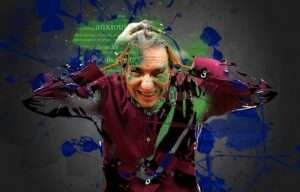Discover 5 Shocking Ways Can Porn Causes Anxiety and uncover the hidden impacts on mental health and well-being today.
Are you tired of feeling anxious and unsure why? Do you find yourself scrolling through pornographic content, only to feel a sense of unease and discomfort afterward? You’re not alone. Pornography has become a ubiquitous part of modern life, but its effects on our mental health are often overlooked.
In today’s digital age, the pervasive accessibility of pornography has sparked debates on its psychological impacts, particularly its link to anxiety. Understanding these effects is crucial for anyone navigating modern media consumption.
Unrealistic Expectations
Porn creates unrealistic expectations about sex, relationships, and body image, leading to feelings of inadequacy and low self-esteem. These expectations can translate to real-life relationships, causing anxiety and stress when they’re not met. The constant bombardment of perfect bodies and sexual performances can make you feel like you’re not good enough, leading to a cycle of negative self-talk and anxiety.
- Porn often portrays exaggerated and unrealistic sexual scenarios.
- Viewers may internalize these as norms, leading to dissatisfaction.
- This discrepancy between reality and fantasy can induce anxiety.
5 Shocking Ways Can Porn Causes Anxiety
Social Anxiety and Porn Addiction
Social anxiety causes intense, irrational fear and discomfort in social interactions, impairing daily life. This can lead to feelings of inadequacy, low self-esteem, and a fear of being judged or evaluated by others. Individuals with social anxiety disorder experience high levels of distress, which often impairs their ability to function, maintain relationships, and participate in activities they once enjoyed, leading to feelings of loneliness and isolation.
- Social anxiety can be fueled by pornography addiction, as individuals prioritize watching porn over socializing with others, leading to a decline in social skills, and a fear of being rejected or ridiculed, making it even harder to form and maintain relationships.
The constant exposure to unrealistic and unattainable beauty standards in pornography can exacerbate social anxiety, leading to feelings of inadequacy and low self-esteem. This can create a vicious cycle, where individuals turn to pornography as a way to escape their social anxiety, but ultimately end up fueling their anxiety even further.
Pornography-Induced Anxiety Cycle
Heavy use of porn can lead to feelings of guilt, shame, and embarrassment, fueling greater feelings of helplessness and psychological suffering. Individuals may hide their behavior from others, creating a cycle of anxiety as they fear discovery, leading to feelings of paranoia, and a constant sense of being “on edge,” waiting for someone to find out about their secret.
- This can lead to social isolation, self-consciousness, and a fear of interacting with peers or dating, as individuals become increasingly withdrawn and isolated, leading to a decline in mental and physical health.
The constant fear of being discovered can also lead to anxiety-related physical symptoms, such as headaches, stomach problems, and sleep disturbances. This can further exacerbate the anxiety cycle, making it even harder for individuals to break free from their porn addiction.
Brain Chemistry Imbalance
Regularly watching porn can change brain chemistry over time, leading to a hormonal imbalance. Elevated levels of serotonin, dopamine, and norepinephrine can cause a dependence on these chemicals, leading to porn addiction, as the brain becomes reliant on the constant release of these neurotransmitters.
- This imbalance can also contribute to anxiety, as the brain becomes more dependent on these elevated levels, leading to feelings of restlessness, irritability, and agitation when porn use is interrupted or stopped.
The constant exposure to pornography can also lead to desensitization, where the brain becomes less responsive to normal sexual stimuli, leading to a need for more extreme or violent content to achieve the same level of arousal.
This can create a vicious cycle, where individuals become trapped in a cycle of addiction, leading to increased anxiety and decreased overall well-being.
Relationship Difficulties and Porn Use
Viewing pornography can be a form of sexual exploration for romantic couples or an outlet for those dealing with relationship problems, such as a lack of intimacy, communication, or emotional connection. However, if a person feels unsatisfied in their relationship physically or emotionally, they may turn to porn, leading to feelings of anxiety and guilt.
- Porn use can also lead to financial anxiety or strain, as individuals seek higher quantities of pornography-related materials, leading to a decline in financial stability, and a sense of shame and guilt about their spending habits.
The secrecy and deception involved in hiding porn use from a partner can lead to feelings of anxiety and guilt, further straining the relationship. This can create a vicious cycle, where individuals turn to pornography as a way to cope with relationship problems, but ultimately end up exacerbating the issues even further.
Loss of Motivation and Daily Life Impacts
Porn addiction can reduce motivation to engage in everyday life, leading to a decline in responsibilities, including work and school. Individuals may prioritize watching porn over socializing, leading to feelings of anxiety and isolation, as they struggle to maintain relationships, and participate in activities they once enjoyed.
- This can also lead to a fear of their partner or loved ones finding out about their porn habit, increasing anxiety and fueling the cycle of addiction, as individuals become trapped in a cycle of secrecy and deception.
The constant exposure to pornography can also lead to a decline in overall motivation and productivity, as individuals become increasingly withdrawn and isolated. This can further exacerbate the anxiety cycle, making it even harder for individuals to break free from their porn addiction and regain control over their lives.
Performance Pressure:
- Pornography often depicts flawless performances and bodies.
- Viewers may feel pressured to replicate these unrealistic standards.
- This pressure can lead to performance anxiety and self-doubt.
Moral Conflicts and Guilt:
- Many individuals experience moral or religious conflicts with porn use.
- This internal struggle can induce guilt, shame, and anxiety.
- Conflicting beliefs about pornography’s impact on personal values.
Emotional Disconnect:
- Excessive porn consumption may hinder real emotional connections.
- Users may struggle with intimacy and authentic relationships.
- Resulting in feelings of loneliness and isolation.
Neurochemical Overload:
- Pornography triggers a surge of dopamine, akin to drug use.
- This constant stimulation can desensitize the brain’s reward system.
- Resulting in diminished pleasure response to everyday stimuli.
FINAL THOUGHTS:
In today’s digital world, it is crucial to comprehend the subtle ways that pornography can affect mental health, especially anxiety. The psychological impacts of watching pornography are many and range from neurochemical imbalances to irrational expectations and moral dilemmas. People may prioritize their mental health and make educated decisions about how much media they consume by being aware of these effects.
FAQs:
Q: Can occasional porn viewing cause anxiety?
A: While occasional viewing might not lead to anxiety for everyone, frequent consumption or reliance on pornography can contribute to anxiety due to its impact on neurochemistry, emotional connections, and self-perception.
Q: How can someone reduce anxiety related to porn consumption?
: Limiting exposure, seeking professional help if needed, and fostering healthy relationships can mitigate anxiety related to porn. Developing a balanced media diet and understanding personal triggers are also crucial steps.
Q: Is all porn harmful?
A: The impact of pornography varies among individuals. Factors like frequency of use, personal beliefs, and emotional resilience play significant roles. It’s essential to evaluate how porn affects your mental health and relationships.
Q: What are signs that porn consumption is causing anxiety?
A: Signs include increased stress, guilt, difficulty in intimate relationships, and obsessive thoughts about pornography. If these symptoms persist or impair daily life, seeking support from a therapist or counselor is recommended.
Q: Are there benefits to reducing porn consumption?
A: Yes, reducing porn consumption can lead to improved mental clarity, enhanced emotional connections, and reduced anxiety. It allows individuals to focus on realistic expectations and healthy relationships.











